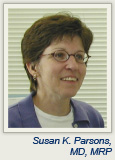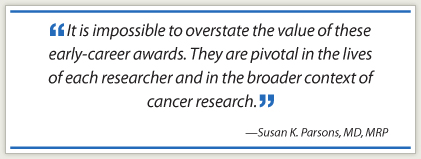 Like all pediatric oncologists, Susan K. Parsons, MD, MRP, knows that when a child is diagnosed with cancer, it happens to the whole family.
Like all pediatric oncologists, Susan K. Parsons, MD, MRP, knows that when a child is diagnosed with cancer, it happens to the whole family.
Siblings must cope with everything from disruption of routine to reduced parental attention, to the often-new possibility of mortality. Parents must navigate a complex health-care system while providing emotional support for their children, managing their own emotions, and juggling career responsibilities and family finances.
The clinical and whole-life impact of treatment of cancer in children—from outcomes of bone marrow transplantation to the impact of high-tech medical interventions on children and families—has been the focus of Dr. Parsons’ work, first at the Harvard-affiliated Dana-Farber Cancer Institute and Children’s Hospital in Boston, and now at Tufts University School of Medicine/Tufts Medical Center, where Dr. Parsons is Professor of Medicine and Director of The Health Institute at the Institute for Clinical Research and Health Policy Studies. She is currently analyzing the results of a 5-year study that offered an integrated Web-platform tool to 200 families with children treated at six transplant centers nationwide, following each of the families for a year.
“The tool provided a wealth of self-directed resources for families—covering everything from coordinating your child’s medical care, to issues associated with re-entry to life post-treatment, to how to talk to your employer when your child is in treatment, to stress reduction techniques, to how to manage your bills,” said Dr. Parsons. “We found incredible variability in how often people used it and which resources they accessed. We’re now tweaking the model and hope to make it available to families in the future.”
Doing this work is the reason Dr. Parsons chose oncology. And it’s the reason she supports the Conquer Cancer Foundation of the American Society of Clinical Oncology.
The Power of Mentoring
 Last fall, Dr. Parsons made a generous donation to the Conquer Cancer Foundation’s Leadership to Legacy campaign, which allows ASCO members to direct their annual contributions to the support of cancer research. “I wish I could do more,” Dr. Parsons said. “It is impossible to overstate the value of these early-career awards. They are pivotal in the lives of each researcher and in the broader context of cancer research,” she added.
Last fall, Dr. Parsons made a generous donation to the Conquer Cancer Foundation’s Leadership to Legacy campaign, which allows ASCO members to direct their annual contributions to the support of cancer research. “I wish I could do more,” Dr. Parsons said. “It is impossible to overstate the value of these early-career awards. They are pivotal in the lives of each researcher and in the broader context of cancer research,” she added.
“ASCO and the Conquer Cancer Foundation awards give people the money they need to fund their research, conduct early studies, and forge key collaborations. You can’t be competitive right now without having this kind of preliminary data, without having a track record of publications.”
Dr. Parsons still remembers the specific date in February when she received the advice that launched her oncology career. “After earning my Master’s degree in health economics at Cornell, I worked as a management consultant in Manhattan and on other cost-containment projects. I was working on a project analyzing the cost-benefit ratio of second surgical opinions—which required interviewing approximately 600 patients about the impact of their illness on their ability to work, their functional limitation, and their follow-up—and I found that I was fascinated by their stories. Even among patients with the same medical conditions, I was struck by the differences in their experiences with their illnesses and with the health-care system. My department head, who happened to be a former pediatric oncologist, said, ‘You don’t sound like an economist. Have you ever considered becoming a physician?’ And that was it. I couldn’t stop thinking about becoming a physician.”
Dual Focus on Clinical Care and Research
In oncology, Dr. Parsons found herself among kindred spirits—colleagues who were interested in the full context of the clinical experience and who integrated research and clinical care into their professional lives. “If they weren’t thinking about the disease, the treatment, and the side effects, they were thinking about their next clinical trial or experiment. A dual focus on clinical care and research is the norm in oncology.”
In 1993, during her third fellowship year, Dr. Parsons received an ASCO Career Development Award (CDA) supporting her outcomes research in pediatric hematopoietic stem cell transplantation. “It was a total career-starter,” she said. “It allowed me to begin this investigation, which is still a focus of my research nearly 20 years later. It allowed me to form my first research team. And it was the first signal that what I wanted to do in outcomes research was possible. Beyond the funding, it was an incredibly important objective, external validation.”
Paying It Forward
In the years since she received her own CDA, Dr. Parsons has paid it forward by mentoring the rising generation of cancer researchers—she proudly reports that David Buchbinder, MD, one of her mentees, received both a Young Investigator Award and later a CDA—and, ultimately, by making a philanthropic gift to strengthen the Conquer Cancer Foundation’s support of the next generation.
“I’m very hands-on with junior faculty,” Dr. Parsons said. “It’s great to be able to help them get established, and help them to be strategic about knowing which project might lead to another. It’s also incredibly gratifying to help fund the future of cancer research by contributing to the Conquer Cancer Foundation,” she commented.
“I can’t imagine why any oncologist wouldn’t want to support the Foundation’s work,” Dr. Parsons added. “Research is at the core of oncology. It’s how our field developed and grew, and it’s the basis of every new discovery and every new therapy. It’s essential that we invest in the development of new therapies, and also in research to evaluate those therapies. It’s so very important that we keep that work going by investing in the work of young investigators.” ■
© 2012. American Society of Clinical Oncology. All Rights Reserved.

